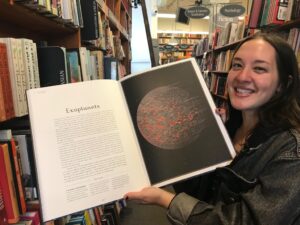
SETI Institute Awards Davie Postdoctoral Fellowship for AI/ML-Driven Exoplanet Discovery
MOUNTAIN VIEW, Calif., Aug. 15, 2025 — The SETI Institute awarded the Davie Postdoctoral Fellowship for AI/ML-driven exoplanet discovery to Isabel Angelo. Machine learning is changing the way we search for exoplanets and making it possible to discover patterns in massive datasets. Angelo’s research will refine and expand ML-driven pipelines for detecting exoplanets, and she will work with SETI Institute researcher Dr. Vishal Gajjar and his team and collaborators at the SETI Institute and IIT Tirupati in India.
 The project will enhance supervised Convolutional Neural Network (CNN) architectures and integrate anomaly-detection techniques to identify subtle or unconventional exoplanet candidates hidden in massive datasets. These could include ringed or disintegrating worlds, exocomets, complex multi-planet systems and possibly signs of alien megastructures.
The project will enhance supervised Convolutional Neural Network (CNN) architectures and integrate anomaly-detection techniques to identify subtle or unconventional exoplanet candidates hidden in massive datasets. These could include ringed or disintegrating worlds, exocomets, complex multi-planet systems and possibly signs of alien megastructures.
Angelo earned her B.A. in Astrophysics from UC Berkeley in 2017, and graduated this year with a PhD in Astronomy and Astrophysics from UCLA. She’s worked at the intersection of machine learning, physical models, and statistical methods to search for planets, binary stars, and anomalies in datasets including Kepler and Gaia.
“Joining the SETI Institute as a postdoc is a full circle moment for me,” said Angelo. “My first-ever research project was at SETI in 2015; I was looking for planets in Kepler data. To return 10 years later to search for anomalies and megastructures in that same dataset is surreal. I’m so excited to work among experts who address questions about ET from so many different angles, and I feel incredibly lucky to have been given this opportunity!”
The SETI Institute is grateful to John Davie, who supports the Davie Postdoctoral Fellowship.
“Isabel Angelo’s hiring marks an exciting new chapter for the Davie Fellowship,” said Davie. “With her proven track record in analyzing complex astronomical datasets—from discovering exo-Venuses to developing innovative orbit-fitting software—Isabel is uniquely positioned to pioneer AI-driven approaches like detecting time-varying atmospheric signals that could indicate biological activity. This fellowship, in collaboration with SETI’s visionary team, is poised to uncover profound insights into the cosmos, and Isabel is the ideal leader to make that happen.”
Thanks to space telescopes such as TESS and Kepler, discovering exoplanets is more common than ever. But they have also produced huge amounts of data requiring advanced AI analysis. Angelo’s work will push detection methods beyond conventional transit searches, helping the scientific community uncover rare or unexpected planetary systems.
“The scale of TESS and Kepler data demands machine learning,” said Gajjar. “With John Davie’s visionary support, we can pair cutting-edge AI with rigorous astrophysics—and move from ‘find more planets’ to ‘find the unexpected.’ Isabel Angelo will lead the development of tools that flag anomalies worthy of human follow-up, from complex multi-planet dynamics to unconventional transit signals, including potential technosignature candidates.”
The Davie Postdoctoral Fellow will work at the intersection of machine learning, astrophysical modeling, and interpretability, driving the next generation of exoplanet discoveries. This approach includes searching for megastructures to address the age-old question: “Are we alone in the universe?
By combining machine learning, astrophysical modeling, and data interpretability, this fellowship will contribute to the SETI Institute’s broader mission to lead humanity’s quest to understand the origins and prevalence of life and intelligence in the universe.
About the SETI Institute
Founded in 1984, the SETI Institute is a non-profit, multi-disciplinary research and education organization whose mission is to lead humanity’s quest to understand the origins and prevalence of life and intelligence in the universe and to share that knowledge with the world. Our research encompasses the physical and biological sciences and leverages expertise in data analytics, machine learning and advanced signal detection technologies. The SETI Institute is a distinguished research partner for industry, academia and government agencies, including NASA and NSF.
Source: SETI Institute



























